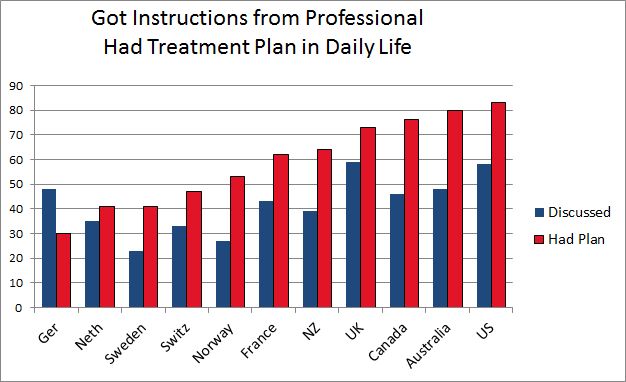“We need to get rid of Obamacare,” says Ed Gillispie in a NYT op-ed. The reason: Obamacare’s “gravitational pull toward a single-payer system that would essentially supplant private insurance with a government program.”
Gillespie, who lays out his credentials at the start of the article – he ran for Senate in Virginia and lost – notes that Obamacare is unpopular. But he omits all mention of a government-run single-payer system that happens to be very popular – Medicare. No Republican dare run on a platform of doing away with it. Gillespie himself accused Obamacare of cutting Medicare, a statement that Politifact found “Mostly False.”
Over half the U.S. seniors say that they are taking four or more prescription drugs; all the other countries were below 50%:
And despite Medicare, money was a problem. Nearly one in five said that in the past year they “did not visit a doctor, skipped a medical test or treatment that a doctor recommended, or did not fill a prescription or skipped doses because of cost.” A slightly higher percent had been hit with $2,000 or more in out-of-pocket expenses.
In those other countries, with their more socialistic health care systems, seniors seem to be doing better, physically and financially. One reason that American seniors are less healthy is that our universal, socialized medical care doesn’t kick in until age 65. People in those other countries have affordable health care starting in the womb.
Critics of more socialized systems claim that patients must wait longer to see a doctor. The survey found some support for that. Does it take more than four weeks to get to see a specialist? U.S. seniors had the highest percentage of those who waited less than that. But when it came to getting an ordinary doctor’s appointment, the U.S. lagged behind seven of the other ten countries.
There was one bright spot for U.S. seniors. They were the most likely to have developed a treatment plan that they could carry out in daily life. And their doctors “discussed their main goals and gave instructions on symptoms to watch for” and talked with them about diet and exercise.
But you’d think that they might take a second look at Medicare, a program many of them publicly support.
* Includes hypertension or high blood pressure, heart disease, diabetes, lung problems, mental health problems, cancer, and joint pain/arthritis.
Cross-posted at Montclair SocioBlog and Pacific Standard.
Jay Livingston is the chair of the Sociology Department at Montclair State University. You can follow him at Montclair SocioBlog or on Twitter.






Comments 11
Larry Charles Wilson — December 17, 2014
The idea that the rest of the world might become more like America keeps me up at night.
Bill R — December 17, 2014
Today's older Americans suffer from the italicized diseases above because they smoked for 40 years, drank too much, ate greasy/sugary crap and are fat. Becoming Sweden can't fix that.
Heather — December 22, 2014
I wonder if these statistics could be biased by a higher diagnosis rate in the US. The DTC marketing of pharmaceuticals is also a likely driver of their increased use in the US. The finances of medicine aren't the only difference between the US and these countries.
International perspectives on healthcare | KVCAP Poverty Bulletin — February 2, 2015
[…] http://thesocietypages.org/socimages/2014/12/17/medicare-vs-national-health-care-how-u-s-seniors-do-… […]
health — November 10, 2019
I think Obamacare’s health care system the world is moving towards improvements. It is a good national health plane
lana — November 10, 2019
Hey!
I think Obamacare’s health care system (medical answering service) the world is moving towards improvements. It is a good national health plane
Aiden Aiden1 — July 15, 2021
When I read that Over half the U.S. seniors say that they are taking four or more prescription drugs, I was shocked. I think that CBD dog treats can help people overcome this threat.
glan robinson — February 4, 2022
The last time I was there, I didn't see anything like that. But maybe they just ran out of it when I came there.
Harry Fields — February 6, 2022
Good question. Personally, I do not like smoking, it is bad for the throat and lungs. There might even be cancer! Why do you need this? If you want to take cannabis, you can try some cbd products. There are a lot of variants, so everyone can choose something interesting.
SamHanson — October 23, 2022
I believe that the conditions of seniors in as is much better than in many pther countries. I know that a lot of them use cbd oil to stay good. If you've been growing cannabis for a while, you know that in some cases, the plant just doesn't grow as well as it should, and that's why many people use fertilizers. You can follow this link and consider using them too, and I'm sure it won't take you long to collect a high-quality harvest. Good luck!
Sarah — May 23, 2023
It's worth considering whether these statistics could be influenced by a higher rate of diagnosis in the United States, potentially leading to inflated numbers. Another factor that may contribute to the cambiati increased usage of pharmaceuticals in the US is direct-to-consumer (DTC) marketing, which is prevalent and influential. It's important to note that differences between the US and other countries extend beyond just the financial aspects of healthcare and medicine. There are various factors at play that shape the contrasting landscape of pharmaceutical utilization and healthcare practices.